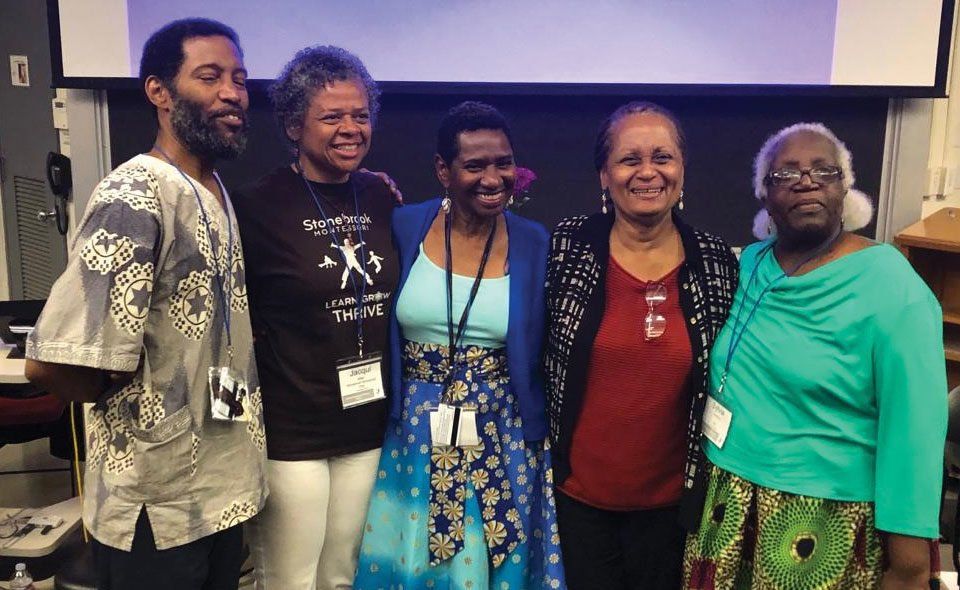
It’s no secret that black children are disproportionately represented in special education classes, suspended from school and expelled at higher rates than their peers. That's because many schools are not set up to meet their needs. They lack the resources necessary for black students to excel academically, socially and emotionally. The true purpose of education is to prepare individuals to be self-sufficient, independent thought leaders. Montessori education prepares children for life.
The true purpose of education is to prepare individuals to be self-sufficient, independent thought leaders. Montessori education prepares children for life.
Montessori is one of the most diverse educational options available to black children as it provides a safe, enriching and affirmative learning environment.
It is important for any parent who is interested in providing their child with a quality education to consider what type of school they would like their child to attend. There are many different types of schools that parents can choose from, such as charter or public schools; however, there are several schools that provide a unique educational experience for students who wish to learn more about themselves and about their community. One such school that offers an alternative approach for educators and parents alike is Montessori schools.
According to Dr. Laura Turner-Essel "Research shows that Black students experience school as more hostile and demoralizing than other students do, that they are disciplined more frequently and more harshly for typical childhood offenses (such as running in the halls or chewing gum in class), that they are often labeled as deviant or viewed as deficient more quickly than other children, that teachers have lower academic expectations of black students (which, in turn lowers those students' expectations of themselves). Perhaps these are some of the underlying reasons that black students tend to underperform in most schools across the country."
The Montessori Method recognizes the unique nature of each child and seeks to meet each one on his/her own developmental level. Rather than a one size fits all approach where everyone is expected to learn at a certain pace at certain times during their day; Montessori provides multiple ways for children to learn according school age appropriate materials presented in small groups with an emphasis on self-directed activities rather than teacher directed instruction.
In contrast, the Montessori method provides an environment in which children see themselves reflected as part of a larger community.
Instead of focusing on what the child is not doing, Montessori focuses on what the child is doing. This proactive approach teaches children to solve problems by themselves and encourages independence. With this method, you are able to see your child for who they are and give them the opportunity to be their best self.
In contrast, traditional preschools often focus heavily on academic skills like reading and writing at an early age. While there’s nothing wrong with teaching early literacy skills at this age, it can sometimes lead to frustration when children feel like they aren’t meeting their teachers’ expectations because they aren’t yet ready for them (or just don't want them).
The Montessori method is based on the principle of inclusion and acceptance. "Inclusion" means that children with special needs are educated alongside their typically developing peers. For example, many Montessori schools have a separate class for children with special needs, but all students come together for core classes where they learn alongside one another.
Dr. Montessori believed that all children should be given opportunities to succeed in school and life no matter what their abilities may be or how they learn best. For example, if a child cannot read aloud due to a disability such as dyslexia or autism spectrum disorder (ASD), he or she should still receive direct instruction from an instructor who can use visual aids like photographs or illustrations from books instead of relying solely on oral language input (reading).
Montessori teachers are trained to guide students, not tell them what to do or how to do it. Their goal is to make sure your child feels challenged but supported at all times.
In a traditional classroom setting, teachers are often tasked with breaking down complex concepts into bite-sized chunks that can be easily digested by children. This creates an environment where "right" answers are rewarded while creative thinking is discouraged. A Montessori teacher will instead work closely with your child and help them arrive at their own solutions through collaboration and hands-on learning experiences.
Montessori classrooms are designed to allow students to make discoveries about themselves and the world around them. The teacher's role is not to tell them what to think, but rather, to guide them toward asking questions that will help them understand and learn how they can best fit into their environment.
As a black parent, when considering a school for your child, it’s more than just the education. You have to factor how will my child be treated when you are not around, will my child’s teacher treat them like a member of the community or an outcast, and so much more. Hence why the self-guided learning style of Montessori instils that the child is important and their ideas matter.
Children learn best when they're able to explore their own interests and passions without judgment or pressure from teachers or peers. Montessori students are encouraged to follow their passions, and are given the space, freedom and encouragement to do so.
Montessori classrooms encourage creative thinking and independent problem solving by using real-life materials that engage all five senses.
This helps students develop an understanding of the world around them, which is critical to learning at every stage. When children learn in a Montessori environment, they're allowed to explore their surroundings and discover new concepts for themselves rather than simply being told about them. This type of hands-on learning creates a love of learning that can continue throughout life and make kids much more likely to succeed academically.
Montessori students learn at their own pace, which means they can build on whatever they learned last instead of needing to start over with new topics or repeat lessons until they get it right. This allows for a more personalized education plan and makes learning fun for kids because they're not forced to take a break from what interests them just because it's not part of the normal curriculum
Black parents who want their children to gain a sense of who they are, how they relate to others, and where they fit into the world than Montessori education is the right decision.
Montessori schools foster a love for learning. Children in these programs are more likely to be engaged and take an interest in different areas of study, as opposed to those who are stuck in regular school settings with little variety or interest.
We hope this article has given you a better understanding of what Montessori education is and why it would be a good option for black children. If you’re interested in learning more about how the Montessori method could benefit your child,
contact us today!


